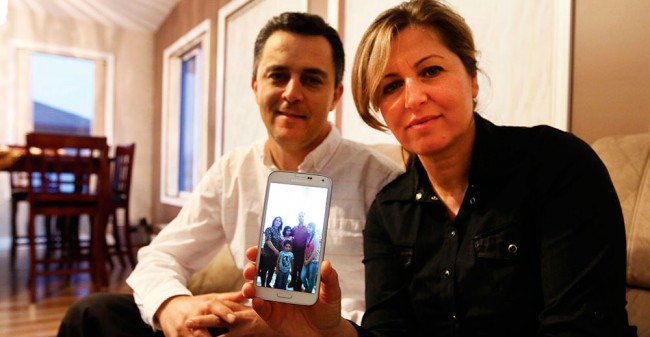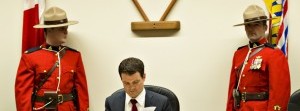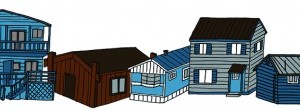
Photo Credit: Submitted
The Unplanned Exodus: Smithers opens doors for refugee families
Every morning, Akram Khalil and Montaha Awil awake to social media. The reality that greets them is a far cry from their quiet existence with two daughters, Norma, 17, and Natalie, 13, in Smithers: displacement, loss and loved ones directly in the line of fire as rebel forces move in on their hometown of Sadad, Syria.
“They’ve given up planning for the long term,” says Awil, “Mona” to her Canadian friends. “They survive day by day.”
The Syrian conflict began in 2011, creating a refugee crisis in Europe as more than 10 million residents—nearly half the population—fled the country. Two years ago, Awil began inquiring with local organizations about sponsoring family, but was unable to raise interest. Then there was the photo.
The image is well known, compelling in both its innocence and tragedy: toddler Alan Kurdi laying facedown on a beach after the boat in which his family fled Syria capsized in the Mediterranean on Sept. 2. Though hard to look at, it caused the crisis to explode in the news and on social media.
“This image is one from a million images,” Khalil says.
“It’s not the worst,” Awil adds.
Indeed, it was unique only in that it brought the plight of refugees to the attention of Canadian residents and decision makers. It wasn’t long before a Smithers group formed to sponsor a Syrian family.
Community comes together
“I decided I needed to do something,” Smithers resident Pauline Mahoney says. She wasn’t alone. An initial meeting, called in early September, resulted in five individuals who volunteered to be legally responsible for the family. In government lingo, this process of refugee sponsorship is known as G5.
While the five will be financially, emotionally and physically responsible for the refugees for one year, they have an entire community behind them. That initial meeting turned out everyone from counsellors and therapists to nurses and an ESL teacher, all wanting to contribute. Offers of help include accommodation, employment, a lawyer to review paperwork and fundraising plans. Mahoney walked away with an email list of nearly 60 people interested in being involved.
“I’m still getting calls and emails several times a week with specific offers of help,” she says. “It’s huge.”
Perhaps not surprisingly, negotiating government bureaucracy has been one of the greatest challenges. Once the paperwork to sponsor a family was complete, the group realized they needed to attach refugee information before submitting.
“Then you suddenly realize you have to have a refugee,” Mahoney says.
After chasing their tails with government services that had been discontinued, the search began for a local Syrian family who might be able to connect them with someone overseas.
Finding family
“That’s a funny story,” Awil laughs. By the time Mahoney approached her, the G5 group had learned about a dental hygienist in Houston, a woman working at a Smithers optometrist’s and a student at Smithers Secondary School, all from Syria. “They were all talking about the same family,” she says.
The couple, who has lived in Smithers five years after a year in Houston, has been back to Syria twice since leaving in 2000 and is in daily contact with family in Homs and Sadad, sometimes speaking with them to the sound of bombing in the background. The high cost of living in Syria and up-front funds needed to claim refugee status make it hard to leave.
“I hope more people will get motivated to bring people over,” Awil says. “You can no longer sleep when (rebels) are 10 km away from you.”
Sadad, located 60 km south of Homs, is a Christian town surrounded by Muslim communities. Its location is strategic, sitting near the highway that runs between Homs and Damascus. Two years ago, an attack by rebel forces killed 46 of Sadad’s 3,500 residents.
This October, ISIS militants came within three kilometres of Sadad, only to be pushed back to Mahin, 17 km away. At press time in mid-November, the situation in Sadad was evolving daily, with the town continually under threat. Awil’s mother had been evacuated to Homs, but Khalil’s father, who is blind, was unable to leave and was being looked after by another son.
Does the couple wish they could be closer?
“I wish they were closer to me!” Awil manages to laugh through the painful helplessness. The couple is already sponsoring two families—Awil’s sister and Khalil’s brother—to come to Canada. Having community support to bring more (and, at this point, any Syrians feel like family) provides some levity in what has been a difficult few years.
“With war comes everything, crimes and kidnappings,” Awil says. “To see something so beautiful here—I’m speechless.”
Leaving it all behind
When the G5 approached them, the family they suggested for sponsorship was Awil’s cousin, Saied Assaf, his wife, Eviet Danbar, and their three children, Julie, 12, Jessica, 15, and Yousef, 5, who were living in Homs when the conflict began.
“They left and their house was burned,” Awil says. They lost everything, crossing into Lebanon to await new identification papers and at one stage needing to return to Syria for a medical appointment, briefly putting their opportunity to immigrate in jeopardy.
By mid-November, the G5 had completed its paperwork and was waiting on the family’s new passports to submit it to the Canadian government. The group had already raised half of its original $40,000 fundraising goal, including contributions from children who have donated birthday money and weekly allowances.
“I’ve had several children who have given half or all their birthday money,” Mahoney says. “I think it’s really important for children to have compassion, to know what goes on in the world, and know they have power to do something about it.”
The response has been so overwhelming the group recently decided to double their efforts, bringing a second family over, this time through a government-sponsored program. There is no shortage of refugees needing help: Awil alone has three sisters, all with children who have families of their own, who are now scattered across Europe.
“We can provide as many families as you want,” she laughs.
Starting over
A strong woman with piercing blue eyes, after more than two hours telling her story Awil’s solid veneer begins to exhaust itself.
“It’s not easy to talk about,” she says. Instead, she scrolls through her smartphone, showing me images on social media of those who have been killed in their small, close-knit community: this woman was her schoolteacher; this man a member of her extended family; here, the image of a boy, only 15, who was struck by debris. She knows them all.
She and Khalil immigrated by choice. They had time to plan their move and build a life. Refugee families leave everything behind—their possessions, their homes, everything they’ve worked for, even their careers—to start over.
Yet, it’s still better than the alternative.
For more information or to donate to Smithers’ refugee sponsorship group, visit www.bvsponsorshipgroup.weebly.com.
The group is planning a Get to Know Syria Night, Saturday, Nov. 21, 5:30 to 8 p.m. at Bulkley Valley Christian School. The evening is by donation and includes Syrian food, a slide show, belly dancing, games and a dessert auction. All proceeds go toward sponsorship.
It’s hoped the first family will arrive in the Bulkley Valley by spring. The plan is to allow them some time to settle in, then hold a welcome gathering and potluck so they can meet the community that so desperately wanted to bring them here.
Looking back
For records of average and extreme snowfalls and snow depths, the Environment Canada website, www.weather.gc.ca, has daily, monthly and historic information going back to the 1900s for certain communities in northern BC. For a higher elevation site (900 m), check out Unuk River Eskay Creek. The amazing snow depths make fascinating reading.






